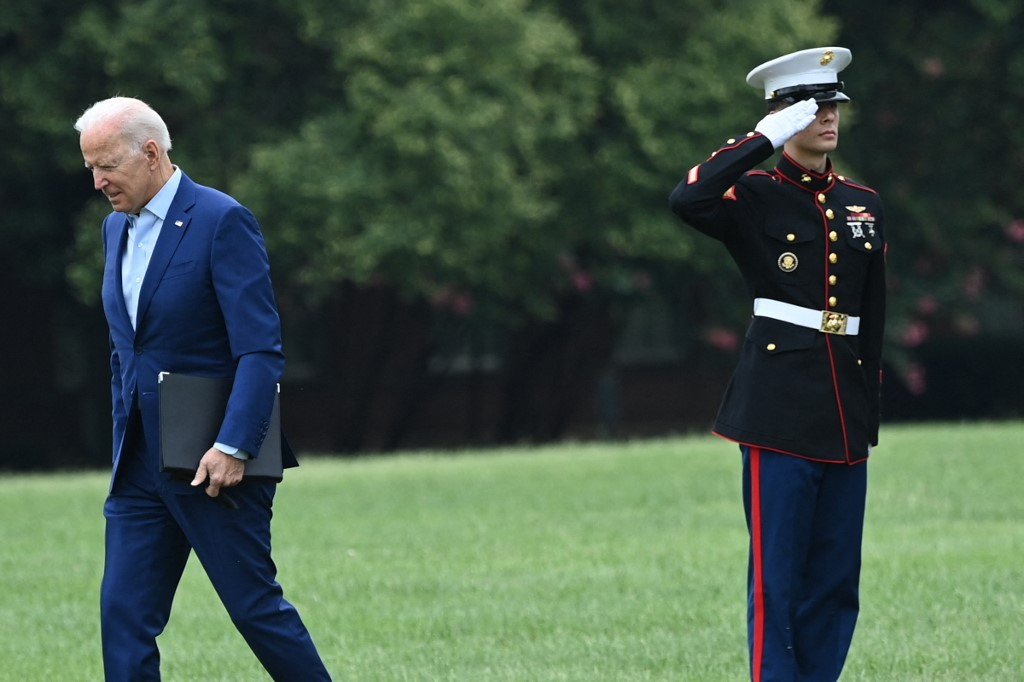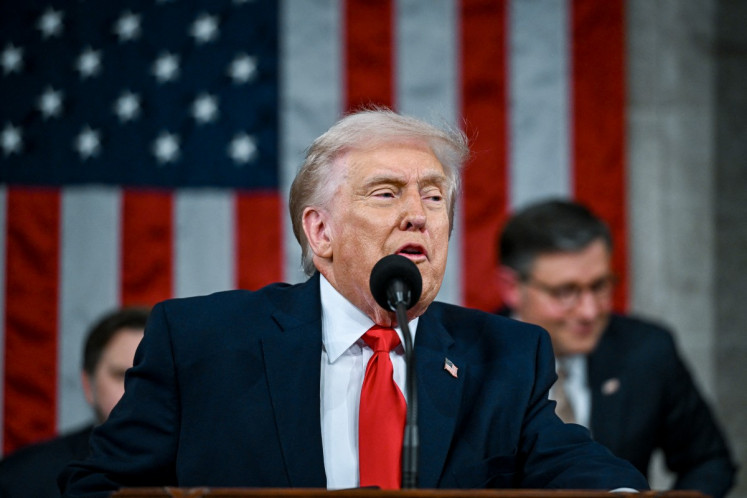Popular Reads
Top Results
Can't find what you're looking for?
View all search resultsPopular Reads
Top Results
Can't find what you're looking for?
View all search resultsBiden to ramp up three-way Japan, S.Korea ties in sign to China
The summit at the Camp David in the mountains west of Washington would have been unimaginable until recently, with the two treaty-bound US allies at loggerheads for decades over the legacy of Japan's harsh 1910-1945 occupation of the Korean peninsula.
Change text size
Gift Premium Articles
to Anyone
U
S President Joe Biden on Friday will announce new security cooperation at a first-of-a-kind three-way summit with the leaders of Japan and South Korea, hoping to send a message of strength to China which has already made clear its displeasure.
The summit at the Camp David presidential retreat in the mountains west of Washington would have been unimaginable until recently, with the two treaty-bound US allies at loggerheads for decades over the legacy of Japan's harsh 1910-1945 occupation of the Korean peninsula.
But South Korean President Yoon Suk Yeol, taking political risks at home, has turned the page by resolving a dispute over wartime forced labor, instead calling Japan a partner at a time of high tensions with both China and North Korea.
Biden, Yoon and Japanese Prime Minister Fumio Kishida will agree to a new three-way crisis hotline and regular military drills and will agree to hold trilateral summits each year, US officials said, hoping to institutionalize the progress.
"We have created something that is exactly what China was hoping would never happen," said the US ambassador to Japan, Rahm Emanuel.
"Our message is we are a permanent Pacific power and presence, and you can bet long on America," he said at the Brookings Institution.
China, Emanuel said, should understand: "We are the rising power; they are declining."
China has flexed its muscle both at home and in Asia under President Xi Jinping, exerting disputed maritime claims and carrying out major exercises near Taiwan, the self-ruling democracy claimed by Beijing.
Chinese Foreign Minister Wang Yi urged the two economically developed Northeast Asian democracies instead to work with Beijing to "revitalize East Asia."
"No matter how blond you dye your hair or how sharp you shape your nose, you can never become a European or American, you can never become a Westerner," he said in a video shared on official media.
"We must know where our roots lie," he said.
China's pressure tactics have led to a sharp deterioration in its favorability in Japan and South Korea in recent years.
But unlike Emanuel, a blunt-talking former congressman, the Japanese and South Korean leaders are expected to tread more cautiously in public remarks on China, which is not expected to feature overtly in a joint statement.
Kurt Campbell, who heads Asia policy at the White House, said however that the three leaders are expected to discuss Taiwan and preserving "international law" at sea.
"We can imagine a future with more ambition," Campbell said.
Cooperation in the past has been largely centered on the mutual threat of North Korea, which again in recent months has carried out a slew of missile tests.
South Korean intelligence believes Pyongyang is preparing to test launch an intercontinental ballistic missile to coincide with the Camp David summit, Yonhap news agency reported Thursday, in a show of defiance against the trilateral meeting.
US officials hope to move beyond a focus on North Korea or even just Asia, with Tokyo and Seoul the most prominent non-Western nations to support Ukraine after the Russian invasion.
Secretary of State Antony Blinken said he saw a "new era in trilateral cooperation."
"Japan and South Korea are core allies -- not just in the region, but around the world," Blinken said.
It will be the first time the three countries' leaders meet outside the context of a larger summit and the first diplomatic event since 2015 at Camp David, famous for Middle East peacemaking.
Campbell acknowledged that a future leader could reverse the three-way initiatives but said, "We are going to try to embed this in our politics in such way that it will be hard for any leader, in either of the three countries" to move back.
Despite some protests against Yoon over Japan, polls in both South Korea and Japan has been more upbeat than expected, said Mira Rapp-Hooper, senior director for East Asia and Oceania on the National Security Council.
Both Japanese and South Koreans feel that there are "a number of fundamentally aligned values and interests that should bring them together," she said.
Yoon, a conservative, has quickly become a close US ally, with Biden welcoming him for a rare state visit in which the South Korean leader regaled the audience by singing "American Pie."
Scott Snyder, a Korea expert at the Council on Foreign Relations, said that domestically Yoon has already paid "the political down-payment" on reaching out to Japan and could move securely ahead.
But Yoon is constitutionally prohibited from serving more than a single term, which ends in 2027.
"On the South Korean side, the focus really is likely to be on pushing forward and trying to institutionalize as much as possible in order to hedge against the risk of reversal in the event that President Yoon is not succeeded by a like-minded president," Snyder said.










